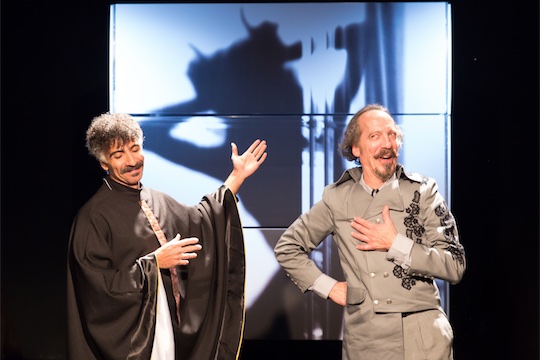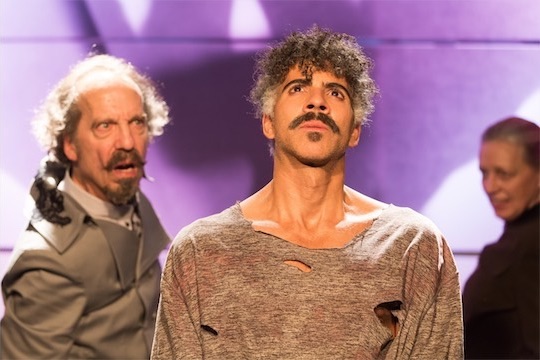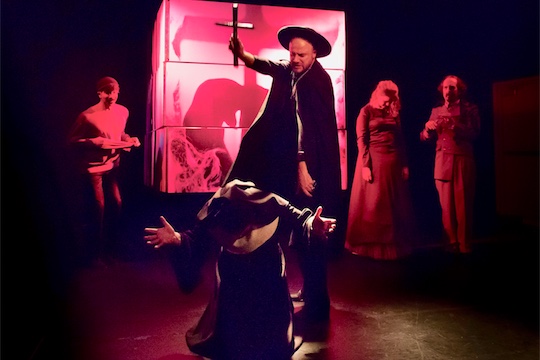
I went with no expectations. Thirty-seven years as a critic does that to you. You absorb music or theatre not on your terms, but on that of the musicians, composers, actors, directors, designers and playwrights. The latter’s was my hat this time, and the destination was Washington DC, where Scena Theatre was mounting the world premiere of my play Guilt at the Atlas Performing Arts Center.
In advance I was often asked if I was excited, but that would have been to have expectations. What I did have was curiosity. I already knew the calibre of actors that Scena’s brilliant artistic director, Robert McNamara, could assemble, having attended a staged reading of Guilt in 2014, and I’d seen video clips of another reading Scena had given this past September at the Kennedy Centre, with four-fifths of this production’s cast. If they were that good with minimal rehearsal and scripts in their hands, how much better did they get? With how much electricity might my verse be charged?

Verse? Yes, Guilt was mostly written in verse when it tumbled into my head in the wee hours of successive nights over a six-week period 10 years ago. Then I had just reacquainted myself with the story of Urbain Grandier, the 17th-century philandering French priest who was burned after being wrongly convicted of bewitching a convent of nuns. This has spawned numerous works of history and art (the pick being the Polish director Jerzy Kawalerowicz’s 1961 film Matka Joanna od Aniołów). I found my own way into what I subtitled An Opera Without Music by making it a story about people who couldn’t tell truth from fiction, or discern between sexual and spiritual rapture.
Because it was set in 17th-century France and was penned in verse I expected it to be ridiculed by the Australian theatrical establishment (which tends to prefer plays about real estate and sexual politics), so instead I sent it to the great British theatre practitioner Steven Berkoff. He suggested Scena as a home.

So on January 4 my partner Maya and I arrived for five nights in what Robert calls “Trumptopia” – just as it was suffering one of its worst-ever cold snaps. Despite eight years in Invercargill at the foot of New Zealand I’d never been as cold as when we stepped out of the airport terminal. Factoring in wind chill it was around -22 ͦC.
What was to have been the first preview the next night was closed to the public at the last moment to fine-tune lighting, sound and staging elements. The run-through, however, did allow me to relish the intellectual rigour and flaring imagination that the Slovenian designer Eva Petric had brought to bear with her Rubik’s cube of shadow images. Like her costumes the design was adroitly non-literal and thrillingly evocative. Two days later we returned for a matinee preview and, despite two actors still being insecure with their lines, I could now see that the production successfully realised the jolting, jarring transitions from frothy comedy to confronting darkness.

That night Robert assembled a different group of exceptional actors to read another of my plays, The Last Drop. Hearing this spring to life before my ears was a singular joy, with the luminous Sara Barker bringing spearing emotion to her lead role.
Guilt’s opening night was deemed worthy of a story about Eva’s involvement by Slovenian national television, and also attracted the Austrian and Czech Republic ambassadors (but no one from the Australian embassy). The performances shot to another level compared with the final preview, notably those of Nanna Ingvarsson (Jeanne, the delusional prioress) and John Geoffrion (the zealous Jesuit, Surin), while Oscar Ceville (Grandier), Danielle Davy (Brigitte, whom he seduces) and Ron Litman (De Brou, her father and a magistrate) further raised the high level they’d already established at the preview.

At the end I was not so much exhilarated as relieved: I didn’t need to shrink from ownership of my soul-baring verse, and I hadn’t been having a lend of myself for over 40 years. I (no doubt awkwardly) shared a curtain-call, and the after-party afforded my first chance of extended conversation with some of the actors, whose appreciation of the text was especially heart-warming.
I’d given little thought to reviews in advance, my own response being paramount, but at the time of writing four have appeared, and their shared positivity was unexpectedly pleasing, as that meant more Americans than Robert, the actors, and the opening night audience “got” what I was attempting. David Siegel’s review for DC Metro Theatre Arts (https://dcmetrotheaterarts.com/2018/01/10/review-guilt-opera-without-music-scena-theatre/) was especially gratifying in this regard.

On the 40-hour trip back to Katoomba I undertook a surprisingly substantial rewrite of the play – not for this season, of course, but with an eye to the future. There are mutterings of interest in Slovenia, Scena Theatre may take it elsewhere, and – who knows? – an Australian company may one day show some interest.
Link: http://scenatheatre.org/